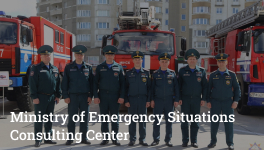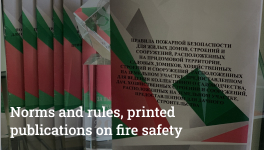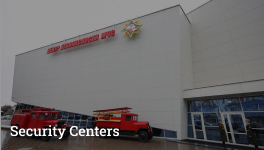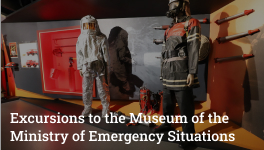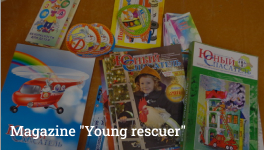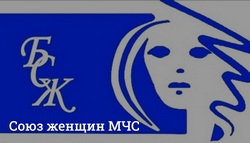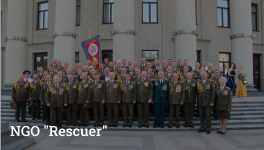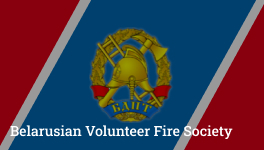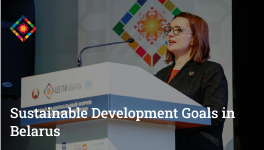Regulatory Strategy of Gosatomnadzor
Our vision of the “assurance of high level of nuclear safety and radiation protection“ concerns enhancing of the safety culture in the nuclear field, in particular, in the context of the construction of the first NPP in Belarus. Our strategic objectives and tasks are being developed and specified in the course of the capacity building in nuclear safety and radiation protection regulation.
The realization of the strategy implies professional management, effective cooperation, mutual understanding, transparency, proficiency and introduction of the latest scientific and technical knowledge. The strategy is pursued in adherence to the specified effective schedules of organizational divisions.
Also, the strategy is based on the mission, values and the outlook up to the year 2018.
Mission
Our mission is to serve to the protection of individuals, the public, the environment and future generations from the harmful impact of the ionizing radiation.
Values
Competence
Our choice, declarations and decisions are based on scientifically proven and recognized knowledge.
Cooperation
Our cooperation is based on good interrelationships, joint participation and mutual trust. While making decisions we take into account opinions of other stakeholders.
Attitude towards safety
Our control (supervisory) activity aims at achievement of the compliance with the highest requirements for the safety culture and includes a critical attitude, a well-balanced approach and an exchange of opinion aimed at safety assurance and enhancement.
Transparency
Our activity is transparent and open for all stakeholders, the population and our specialists.
Outlook for the future
Our outlook up to the year 2018 consists in the guarantee of constant control over the quality of nuclear safety and radiation protection. We implement supervision over providing for nuclear safety and radiation protection both in the process of construction of new nuclear installations and also in the use of existing radiation facilities.
We strive for effective cooperation with all stakeholders, mutual understanding with operators and systemic development of internal capacities and creation of comfortable working conditions
Strategic goals and tasks
The main tasks of Gosatomnadzor include:
- State supervision in the field of nuclear safety and radiation protection;
- Control over implementation of the legislation in the field of nuclear safety and radiation protection.
In the framework of its tasks in supervision and control, Gosatomnadzor launched int. al. implementation of the constant supervision over the construction of NPP Belarus and the audits of the control executed by the Enterprise NPP Belarus over manufacturing and acceptance of equipment for NPP Belarus.
1. Management system of Gosatomzadzor
To improve the effectiveness of the regulatory activity, the existing management system of Gosatomnadzor is steadily advancing, including development and updating of the strategy, safety policy and quality, of actual and annual working schedules, introduction of the process-oriented approach, establishment of the operational system and development of management manuals. Also, the following areas of activity are advancing:
Development of Quality Assurance
Quality Assurance is advancing by development of processes of the quality assurance system; by application of the systematic approach to formation and implementation of quality management, arrangement and execution of self-assessments in the framework of preparation of the IAEA Mission for Integrated Regulatory Review Service (IRRS).
Reinforcement of the Human Resources
The staff was increased from 39 members at the beginning of 2013 up to 82 members in July 2013. 8 new subdivisions were established. 43 new specialists have been employed, including 16 young specialists graduated and trained in physics, radiation chemistry, radiology and engineering. To provide for additional staff resources, Gosatomnadzor pursues an efficient human resources policy in the framework of which experts are selected and assigned for particular jobs and a human resources pool is being formed. The human resources system is being enhanced by steady regulatory knowledge and skills evaluation. Special attention is applied to advancement of safety culture and development of the responsibility of state inspectors who work at Gosatomnadzor and its regional inspections.
2. Competence development and training
There was established a system of initial probation of young staff members for general nuclear safety and radiation protection issues and regulatory activity. Training is affected in parallel to the main activity, in particular, in safety reviews evaluation of the deterministic and safety review, techniques of probabilistic safety analysis and review. Approaches to carry out inspections programs are implemented, including the inspections of structures, systems and components. The training is focused on the practical command of inspection.
Communication
Communication is implemented by:
- Proliferation of trustworthy information about the status of nuclear safety and radiation protection in the Republic of Belarus;
- Improvement of trust towards Gosatomnadzor through public knowledge about nuclear safety and radiation protection;
- Establishment of mechanisms for information of the public about the results of reviews; transparency and access to the information on the results of supervision activities, excluding that which is state secret;
- Far-reaching cooperation with regulators of other countries and international organizations.
- Sustainable interrelationships with legal and executive power for effective decision making and legal acts adoption in the field of nuclear and radiation safety;
- Regularly update communication strategy.
3. Development of legislative and regulatory documentation
Legislative and regulatory documents are developed and improved by adaptation and introduction of modern safety principles, criteria and requirements for:
- Development of regulatory infrastructure of nuclear safety and radiation protection in the Republic of Belarus;
- Development of supervision process during the construction of the NPP;
- Periodic safety review of the NPP under construction, existing nuclear facilities and nuclear material storage facilities;
- Long-term safety of radioactive waste management facilities;
- Implementation of risk-oriented approaches;
- Implementation of measures for technical regulatory documentations implementation;
- providing for physical protection of nuclear facilities, nuclear materials, radioactive waste and radioactive sources.
4. International commitments observance
The observance of international commitments of the Republic of Belarus is implemented in the framework of:
- drafting of national reports on the nuclear safety and participation of the Belarus delegation in the Convention on Nuclear Safety (CNS) Conference;
- drafting of national reports of Belarus in adherence to the commitments in the framework of the Joint Convention on the Safety of Spent Fuel Management and on the Safety of Radioactive Waste Treatment and participation in Conferences of the Joint Convention members.
The further development of the nuclear safeguards in Belarus is being implemented in the framework of the nuclear energy program realization.
Necessary support for implementation of international missions on realization of nuclear and radiation protection, regulatory infrastructure, physical protection int. al. is being rendered.
5. Licensing and safety assessment
To enhance the legal basis of the licensing process, analysis of the work for licensing is being implemented, including:
- updating of requirements for Safety Analysis Report of the NPP;
- Development of the program for Safety Analysis Report assessment and analysis;
- Development of the program for deterministic safety analysis of the NPP;
- Development of the program for probabilistic safety analysis of the NPP
6. Audits and law enforcement
Development and enhancement of the state system of control (supervision) over observance of legislation in the field of nuclear and radiation safety during nuclear energy use throughout the lifetime of nuclear installation is provided by:
- Achievement and maintenance of the duly nuclear and radiation safety of nuclear installations;
- Realization of commitments adopted by the Republic of Belarus in adherence to the IAEA Nuclear Convention of June 7, 1994 in the part of creation and observance of legal and regulatory basis in order to provide for nuclear safety, introduction of international practices and recommendations of the IAEA;
- Restraint of the legislation violations in the field of nuclear and radiation safety and if necessary, application of sanctions;
- Interrelationships with controlling (supervisory) bodies during audits for monitoring of the actual situation at the site of NPP Belarus;
- shaping of the safety culture in the nuclear energy use;
- prevention of legal violations in the nuclear and radiation safety in the nuclear energy use;
- Development of controlling (supervisory) mechanisms.
7. Technical support
Enhancement of technical support is implemented by creation of system of organizations rendering support to the regulatory body, by further development of legislation basis and the procedure of expert organization licensing; by stipulation of rights and duties of state expert institutions and of their powers.
8. Emergency preparedness
Enhancement of the system of control over arrangement of emergency preparedness of nuclear and radiation facilities to respond to accident facilities, over observance of the legislation in the field of nuclear and radiations safety in the case of nuclear and radiation accidents.
9. Radiation protection
Implementation of control over observance of requirements for radiation safety at various stages of the lifetime of nuclear power plant in order to achieve the necessary level of protection for workers, the population and the environment during preparation for the commissioning, commissioning and the operation of NPP Belarus.
Challenges and options of the regulatory system development
1. Safety culture promotion (including “post-Chernobyl” and “post-Fukushima” challenges, stress-tests etc.)
After the accidents at NPPs Chernobyl and Fukushima-1, the necessity of promotion of the safety culture in the nuclear sector is becoming even more obvious. Critical attitude, thorough approach and the necessity of proper communication are becoming even more topical. During the construction and commissioning of the NPP, existing practical manuals should be used for the safety culture assessment. It is an important and a model role that the staff of the regulator plays in the safety culture promotion thus demonstrating their exemplary systematic culture-oriented work.
2. Implementation of the safety requirements the Russian Federation and the IAEA and also the EU best practice in the national legislation and regulatory documents of the Republic of Belarus
International requirements and experience to ensure safety undergo constant development. Outdated national standards are being updated and state-of-the-art standards of the IAEA, the EU and of the Russian Federation are applied which consider int. al. the causes and effects of the Fukushima-1 accident.
3. Capacity building in the framework of the three-years training programs
An individual approach to the development of professional capacity of workers in the regulation should be applied and compliance with international requirements must be achieved by application of necessary means, international experience and best practices on the basis of long-term programs of vocational training, while involving well-trained experts into the regulatory activity and raising their for the long-term cooperation
4. Development of the knowledge management system (maintaining and transfer of knowledge and experience)
A corporate infrastructure which would include tutoring, IT and communication technologies should be established and further developed to promote and implement the corporate experience and topical information by management, preservation and exchange of knowledge for improvement of activities in the field of nuclear safety and radiation protection.
5. Safety analysis in the framework of the process for issuing the operation license of BelNPP
A comprehensive review and peer review (expertise) of the final safety report in the draft version should be arranged and implemented to to check the compliance with the legislating and licensing requirements.
6. Program of inspection of the construction and preparation of the commissioning
Improvement of the programs of control (supervision) activity for safety assurance during the construction and commissioning of BelNPP, including program introduction of the mechanisms of control and assessment of operational safety into the daily practice on the basis of close cooperation with all controlling (supervisory) authorities.
7. Implementation of the integrated management system (ISO 9001, GS-R-3 and GS-G-3.1)
A management system should be created and implemented to integrate all the regulatory aspects in order to ensure priority of safety requirements.
8. Creation of the system of technical support and capacity building of organizations involved into the technical support
An efficient, independent and competent organizational and technical infrastructure should be created of the research institutes (centers), educational institutions, design organizations, engineering offices of enterprises capable to carry out safety expertise of nuclear and radiation safety for licensing of the operation and for special permits for commissioning Units 1 and 2 of BelNPP and to render technical and consultancy support to the regulatory body for the period of at least 60 years.
9. Coordination of activities to assure physical protection
Issues related to nuclear safety and physical security must be coordinated to achieve the maximal level of synergy and if necessary, of the integration.. Observance of the physical protection must be implemented without damage for nuclear and radiation safety and implementation of nuclear and radiation safety may not impair physical protection.
10. Development of national policy and supervision over activities with radiation waste management and spend fuel management
It is necessary to ensure supervision over radioactive waste management and spent fuel management. Control over the implementation of the strategy in radioactive waste from NPP Belarus, including creation of a storage facility to provide for safe storage of very-low-level, low-level and mid-level radwaste after the commissioning of the NPP as well of the high-level radwaste storage facility in a deep geological formation.
11. Safeguards
In the framework of its competence, the commitments determined by the Agreement between the Republic of Belarus and the International Atomic Energy Agency (IAEA) on the application of safeguards in the Republic of Belarus should be undeviatingly observed.
12. Open, effective and systematic communication
By open, efficient and systematic communication strive to instill and maintain the trust of stakeholders and of the public in the safe use of nuclear energy.
13. Mutual international cooperation
A constant participation in international activities and international associations must be ensured to enhance safety. The IAEA Mission for Integrated Regulatory Review Service (IRRS) must be prepared and realized; the results of the Mission must be used for further improvement of the state regulatory activities for the control (supervision) of safety.
Back

 Department for Nuclear and Radiation Safety of the Ministry for Emergency Situations of the Republic of Belarus
Department for Nuclear and Radiation Safety of the Ministry for Emergency Situations of the Republic of Belarus




